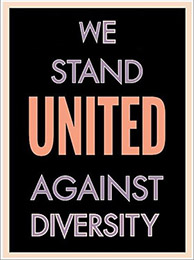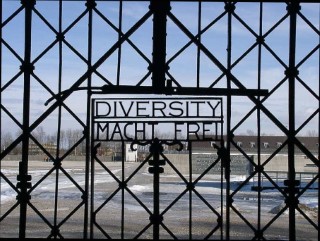Is Diversity Our Strength?
Charles Murray published a book review in the Fall 2022 Claremont Review of Books, titled Diversity and Its Limits. In the article, Murray reviews the book, The Great Experiment: Why Diverse Democracies Fall Apart and How They Can Endure, by political scientist Yascha Mounk. The article is more than a basic book review. In it, Murray discusses a number of salient points relating to, and contrasting between, European versus American societies and their future.
Murray begins his review with:
In The Great Experiment: Why Diverse Democracies Fall Apart and How They Can Endure, political scientist Yascha Mounk asks the most far-reaching political question of our age: can democracies that are ethnically diverse survive? Mounk calls it "the great experiment" because, although democracies throughout the world are becoming more ethnically diverse, the only example of such a democracy that has sustained itself for a significant period of time is the United States - and American democracy itself is in trouble....
Murray notes that it is impractical to magically end diversity by large-scale deportation of immigrants (and illegal aliens), saying "Countries must work with the diversity they already have."
Murray commends many aspects of Mounk's book, but unequivocally states that "America's diversity problems are incomparable to those facing west European countries." He explains why:
1. Murray observes that: "The first disparity between America and western Europe is that whites continue to be an overwhelming majority of the population everywhere in western Europe. Ten west European countries have populations that are over 90% white." In America, whites amount to 60% and will soon become a minority. This is an important difference because in Europe, a large ethnic majority can set the terms of assimilation for minority immigrants. This is no longer an option in America.
Theodore Roosevelt statedd that an immigrant's naturalization should be "predicated upon the person's becoming in every facet an American, and nothing but an American." While historically accurate, this no longer characterizes America's attitude toward unlimited immigration.
Roosevelt stated that "The one absolutely certain way of bringing this nation to ruin, or preventing all possibility of its continuing as a nation at all, would be to permit it to become a tangle of squabbling nationalities." Or perhaps more appropriately stated in our modern era: a tangle of squabbling identify groups.
2. The size of individual ethnic minorities. France's North African population is about 10% of total population. In other European countries, minorities constitute a few percent of the population, and thus cannot become a political force of their own. (Although this will change due to deliberate high muslim fertility.) Contrast that with America where Latinos compromise 19% of the population, blacks 12%, and Asians 6%.
3. Religion is still a source of political division (and strength) in America, while Europe is for the most part secular.
4. Ideological disparity. Murray writes:
No west European country is engaged in an ideological struggle over the proper role of government - social democracy is the consensus political ideology. America has been fighting a political war about the proper role of government since the rise of Progressivism in the late 19th century.
5. America's large geographical size facilitates forms of division that are not possible in smaller European nations.
Murray then notes that Mounk's book is ultimately unserious because Mounk disregards the immensely important aspect of evolutionary psychology (related to human biodiversity). This is important because, as Murray notes:
... one of the Left's most crippling errors for a century now has been to discount the importance of innate and intractable human nature, insisting instead that human tendencies are malleable and that the behavior of large numbers of humans can be changed by design given the right social& policies.
Murray notes that Mounk ignores empirical literature on ethnic diversity and social trust. In particular, ethnic diversity undermines social trust and the cohesiveness of society. Mounk ignores important ethnic differences in social behavior. Regarding marriage:
Asians had the highest marriage rate (61%), followed by whites (54%), Latinos (44%), and blacks (28%) - a huge difference from top to bottom.
Regarding crime, Murray reported research in his 2021 book, Facing Reality: Two Truths About Race in America:
The black-to-white ratio for violent crime arrests across all 13 cities averaged 10:1... The Latino-to-white ratios were smaller, but usually big enough to be significant, with a mean of 3:1 across all 13 cities. The Asian arrest rate was about the same as the white rate in New York City and much lower in the other 12 cities.
In other words, the consequences of ethnic diversity upon a society are real.
Murray concludes by stating:
What were once seen as political arguments are now seen by both Left and Right as a Manichean struggle between good and evil. Ethnic diversity feeds into that polarization in complicated ways.
Murray concludes by emphasizing the importance of recognizing differences between ethnic groups and incorporating these realities into public policy. "Ignoring them guarantees failure."
Related
Charles Murray's Facing Reality, F. Roger Devlin, VDare / American Renaissance, 14 June 2021.
The Bell Curve: Intelligence and Class Structure in American Life, by Richard J. Hernstein and Charles Murray.
"You Have To Tell The Truth" - The Bell Curve After Ten Years, by Steve Sailer, VDare, 10 October 2004.
Is Assimilation Even Possible Anymore?, by Fred Elbel, 5 January 2023.
Educational Equity, Racist Mathematics, and Lowest Common Denominator, by Frosty Wooldridge, 5 January 2023.
The trouble with diversity is... it's divisive! by Fred Elbel, 21 October 2017.
Do Americans Really Want Diversity? by Gregory Hood, American Renaissance, 20 May 2019.
Mass immigration drives nation-destroying diversity, by Frosty Wooldridge, 16 September 2020.


